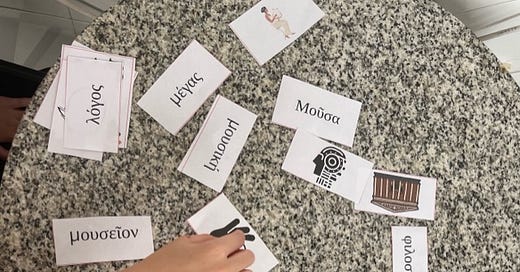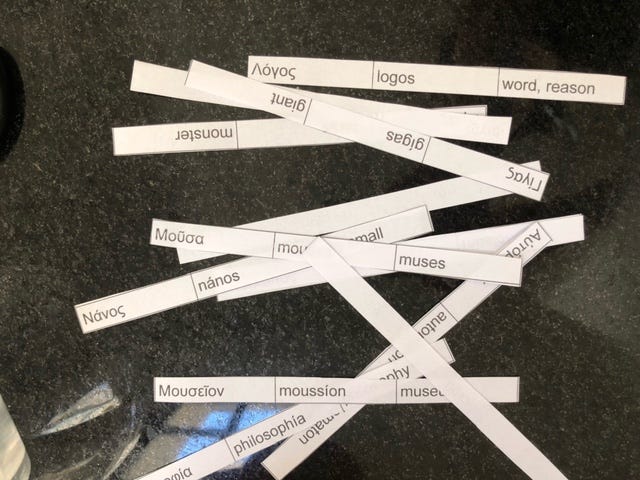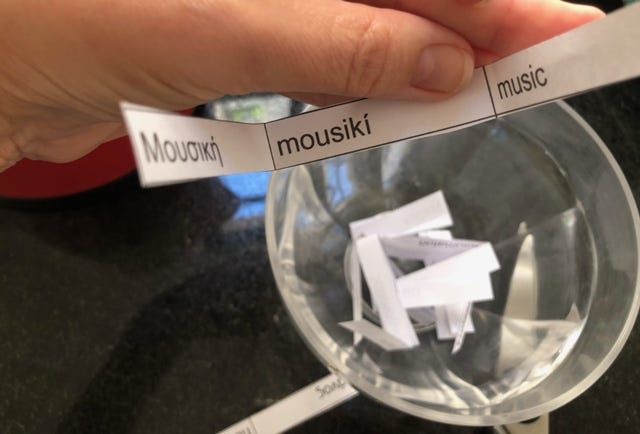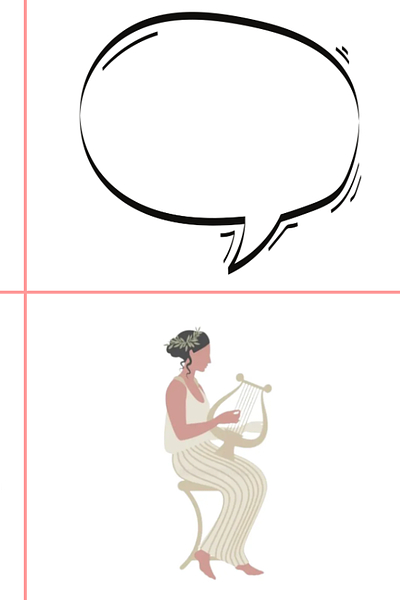Dear Classical KIDS,
Time flies when you are having fun… We’ve been enjoying learning so many new words and ideas in ancient Greek that we didn’t even realise how long we’ve done it.
Yes, it’s been over SEVEN weeks since we first introduced our new Ancient Greek Word of the Week segment... so I think we are well deserving of a review... and games!
First, give yourself (and your kiddos) a pat on the back for learning so many new words. If you don’t remember them all, don’t worry, that’s what review is for.
In fact, I realised we’ve learned SO MANY new words, that we’ll take a week or two to review them all... and what better way to learn than with games? So please enjoy the printable materials below to practice all the new words.
Let’s begin!
Ancient Greek Charades
This game is a good one to begin with because depending on the level, you can include the ancient Greek, the pronunciation and the english. Please print out the sheet below and cut it into strips:
Fold up the pieces of paper (or roll them into scrolls!) and put them into a bowl, cup or jar.
Have children take turns pulling out the word and trying to act it out. When they guess correctly, make sure they recite the word three times in ancient Greek and English. You can also play the game as pictionary and draw instead of acting.
Once they know the words better, you can cut off just the ancient Greek words for a more advanced version.
Mix and Match
Print out the sheet below and cut out both the words and the pictures:
Mix them up on a table and try to match the word with the picture. If the words are a little tricky, try doing it with them a few times first and then see if they can do it on their own.
Ancient Memory Match
Take the cut out words and pictures from the Mix and Match game above and flip them all over so only the blank side is showing. Place them in neat rows. Flip over two at a time, if they are matching, remove them from the board and get a point. If they aren’t a match, flip them back and try again. Once all the cards have been matched, the person with the most points wins.
Flash cards
If the above games are too advanced, don’t worry! Practice makes perfect. First cut the words out as strips rather than individual blocks. Fold them over and use them as flashcards until the children are comfortable with the words. Once they are, you can cut the cards in half and play the games above.
You can also review all the ancient Greek Words of the Week by going directly to the Ancient Greek tab here:
Read through the articles and you may realise a lot of these words you know already...as they are the roots for so many English words!
And as always, let me know what you think. Your feedback is critical and always appreciated...
All the best,
Anya Leonard
Founder and Director
Classical Wisdom and Classical Wisdom Kids










Anya how awesome to be learning Ancient Greek. Here’s my two cents being Greek allow me to share four ancient Greek words for the one singular word in English: LOVE:
Here's a brief explanation of the three types of love reflected in the Greek language:
Eros (ἔρως): This type of love centers around passion, desire, and intense romantic feelings. It's often represented by intense longing and desire for physical connection. This word is the origin of the word "erotic."
Philia (φιλία): This translates to "brotherly love" or deep friendship. This love emphasizes loyalty, mutual respect, companionship, and shared values. While it can be romantic, it focuses on the deeper aspects of connection rather than primarily physical attraction or desire. Philosopher, Philharmonic, Philadelphia, to name a few.
Agape (ἀγάπη): This is considered the highest form of love. It represents a selfless, unconditional, and altruistic love. Agape is often associated with divine love or the love of humanity. It focuses on extending kindness, compassion, and generosity, regardless of circumstances or expectations of anything in return. This is the love that enables us to even love our enemy.
Storge" (pronounced stor-JAY) is a fascinating Greek word that captures the essence of familial love. It transcends mere affection and delves into the deep, natural bond formed between family members. Unlike other Greek words for love, * storge* doesn't focus on passion, friendship, or self-love. Instead, it specifically highlights the unconditional love that often exists between parents and children, siblings, and even extended family. This love is often rooted in shared history, traditions, and a sense of belonging. It's the warmth you feel when surrounded by loved ones, the comfort you seek in their arms, and the unwavering support you know you can always rely on.